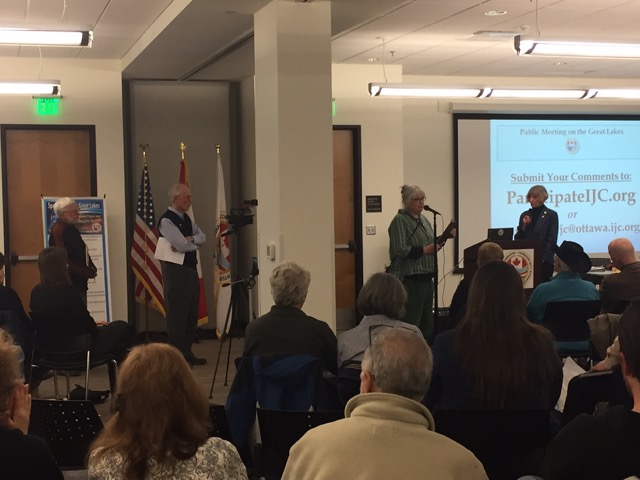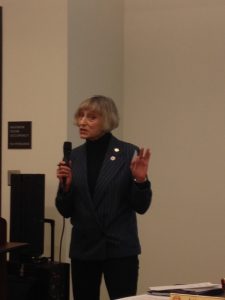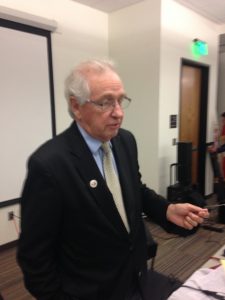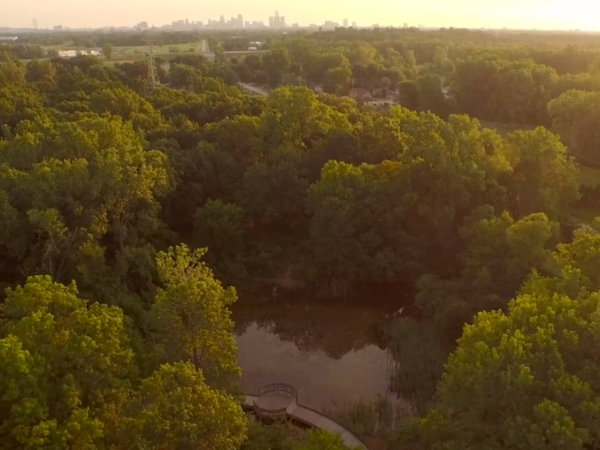
Standing Room Only at International Joint Commission Meetings Across the Great Lakes Basin
From drinking water rights to pollution from fracking; from radioactive waste to invasive species; from algal blooms to contamination from the mining industry; from aging pipelines to a proposed federal budget that would slash funds that help preserve the health of The Great Lakes: just some of the topics at the International Joint Commission Meeting in Detroit on Tuesday, March 21st.
138 people crowded the Michigan Department of Natural Resources Adventure Center along Detroit’s riverfront to participate in one of a series of six public meetings held by the International Joint Commission (IJC) in cities throughout the Great Lakes Basin in March.
Residents came from across Michigan’s Upper and Lower Peninsula and parts of Canada to weigh in on how well the two countries are taking care of the Great Lakes.

Lana Pollack U.S Section Chair of the International Joint Commission, courtesy of Mary Ellen Geist
U.S Section Chair of the International Joint Commission Lana Pollack led the meeting and began by explaining the role the IJC plays in the future of the Great Lakes. She said, “We’re not the budget experts. But we can make recommendations. Typically, IJC does not take a position on U.S. Congressional action.”
The IJC, or International Joint Commission, is an organization that was founded in 1909 when the Boundary Waters Treaty was signed by the US and Canada. The IJC works to resolve and prevent disagreements between the two countries while acting as an independent and objective advisor to the governments. Its responsibilities were expanded with the signing of the Great Lakes Water Quality Agreement of 1978, which was amended in 1987 and 2012.
Getting A “Report Card” On the Great Lakes

Gordon Walker, Canadian Section Chair of the International Joint Commission, courtesy of Mary Ellen Geist
Canada Section Chair Gordon Walker tells Great Lakes Now the purpose of these meetings is to get the public’s response to the Draft Triennial Assessment of Progress Report, and to get a “report card” on how both the U.S. and Canada are doing in maintaining and protecting the health of the Great Lakes.
The Trump administration’s new proposed budget that would cut funds to the Great Lakes Restoration Initiative, The National Oceanic and Atmospheric Administration, The Sea Grant programs and the EPA was on the minds of many of the people who spoke in the public hearing portion of the meeting.
But with recent boil water orders in Detroit that affected thousands of people, and the ongoing crisis involving unsafe drinking water in Flint, many at the meeting said they were worried about the quality of the water in their homes, and clean drinking water rights.
Jim Stone from Macomb County said the Great Lakes are more than a tourist attraction for fishing and swimming. He said, “Our homeland is not secure if our drinking water isn’t safe and you can’t eat the fish you catch in the Great Lakes.”
“Lake Erie Isn’t Getting Better, It’s Getting Worse”
Erma Leaphart with the Sierra Club in Southeast Michigan says she’s worried about phosphorous and harmful algal blooms in Lake Erie as well as “fracking and contamination of groundwater with chemicals we don’t even know about.” She wants the IJC to recommend mandatory government requirements for agriculture to keep the Great Lakes from becoming more polluted. Leaphart says, “Lake Erie isn’t getting better. It’s getting worse.” She also says preventing Asian carp from proliferating in the Great Lakes is imperative for the lakes’ survival.
Several of the participants were worried about Line 5, the controversial pipeline under the Straits of Mackinac, along with concerns about contaminants that can leach into the soil from mining sites in the Upper Peninsula.
“It’s Like They Built a Mansion, But They Forgot to Put in the Toilet”
Carol Izant with the Alliance to Halt Fermi 3 said, “Our overall concern is with the problem of routine radioactive nuclear releases from the 30 nuclear power plants along the shores of the Great Lakes.” She says, “The IJC doesn’t consider radionuclides to be a chemical of mutual concern so they are not able to dial up the dollars to do the science to test and measure the impact of nukes on the Great Lakes Basin.” She says, “Since nuclear power is the most expensive form of energy, it’s like they built a mansion but they forgot to put in the toilet.” Izant tells Great Lakes Now she wants the IJC to make specific recommendations to keep nuclear waste out of the Great Lakes.
One of the experts invited to speak at the IJC meeting presented new research, in collaboration with Henry Ford Health Systems, on the impact of water shut-offs on Detroit residents’ health. Emily Kutil, an adjunct professor at the University of Detroit-Mercy who works with the group called “We the People,” says their research shows residents who get water shut-offs are one and half times more likely to get sick from water-borne illnesses like gastrointestinal diseases, hepatitis and skin and soft-tissue illnesses. Kutil tells Great Lakes Now this is an issue for the IJC since “this is a public health issue affecting the entire city of Detroit, and we should all be concerned not just with the contamination or our water but with the access to water.”
A Commitment to the Great Lakes and To Democracy
One resident introduced a resolution to have all 32 miles of the Detroit River from Lake Erie to Lake St. Clair – which is shared by the U.S. and Canada – be declared a National Heritage Site. Another speaker proposed that Pt. Pelee, which is already a Canadian National Park on Lake Erie, be designated a National Marine Park.
After the meeting, IJC U.S. Section Chair Lana Pollack told Great Lakes Now she was “amazed at the number of people who came and stayed and spoke, and the sense of commitment to the Great Lakes and democracy.”
Standing room only crowds are being reported at IJC meetings being held throughout the Great Lakes Basin. To register to attend one or more of the sessions go to IJC’s website, Participate IJC and the IJC’s social media outlets.




